 |
 |
 |
 |
| |
||||
Risking Your Sight?A CBS 2 News Special Assignment 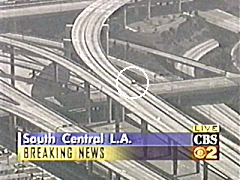 It's been called a modern medical miracle -- laser eye surgery that may actually help you get rid of your glasses. Some people who've had it swear by it, saying it's painless and only takes a few seconds. It's been called a modern medical miracle -- laser eye surgery that may actually help you get rid of your glasses. Some people who've had it swear by it, saying it's painless and only takes a few seconds. But how much do you really know about those high-tech lasers? As CBS 2 News' Thelma Gutierrez shows us, there are some patients out there who wish they'd never had the procedure done. Thelma Gutierrez shows you what you need to know about lasers, and what questions you should ask before considering the surgery. Special Assignment: Risking Your Sight? aired Thursday, April 23, 1998 at 11 p.m. "It's the buyer beware," ophthalmologist Dr. Wendall Wong told CBS 2 News. "I'm real serious." Laser surgery patient Bill Cody learned that lesson the hard way. "I never thought that I'd be sitting here right now being a poster boy for what went wrong," Cody told CBS 2 News. Some call laser eye surgery a miraculous breakthrough, reported CBS 2 News' Thelma Gutierrez. It's painless and takes only a few seconds, freeing patients from contacts and glasses. "My right eye is virtually useless," said Cody. "I now have permanent damage in my left eye," said Hubb Freeman, another laser eye patient. Some doctors echoed that sentiment. "In the worst case scenario, after treatment from one of these black box lasers, you might need a cornea transplant," ophthalmologist Dr. Robert Maloney told CBS 2 News. CBS 2 News also learned about the problems through FDA warning letters. The letters, distributed to doctors, warned physicians that all lasers are not equal and some could even cause serious injuries. Dr. Charles Fritch told CBS 2 News he's seen more and more patients with complications due to bad laser procedures. His patient, Bill Cody, only wanted to improve his distance vision, so he had the LASIK procedure done elswhere one year ago. Cody now says his vision actually became worse. "I was worried if anything could be done, and whether or not I'd have to live with this for the rest of my life," said Cody. Due to distortion and the irregular topography of his eye, it's now nearly impossible for Cody to see out of his right eye. "It's possible that the laser wasn't properly coordinated," Dr. Fritch told Gutierrez. Dr. Fritch and a team of specialists say Cody's only option now is a partial cornea transplant from a donor. The surgery is scheduled in one week. "It's very scary and I'm not looking forward to it," Cody told CBS 2 News. The laser surgery procedure is so new, few people even know what to look for or what questions to ask their doctor, said Gutierrez. According to the FDA, only two lasers -- VISX and Summit -- are approved for use in this country outside of clinical trials. "Some years ago, a number of these Summit and VISX lasers were exported to other countries," Dr. Maloney told CBS 2 News. "When the new technology came along and they became obsolete, some of these lasers were sold back to doctors in the United States. So there are doctors in the United States using obsolete lasers that were never FDA approved." The risk is using outdated software and a laser the FDA says may not be properly maintained or precisely calibrated. "If we can't guarantee that level of accuracy, then we can't guarantee the accuracy of the outcome," ophthalmologist Dr. John Gunn told Gutierrez. The FDA started sending warning letters to doctors throughout the country, telling them to immediately stop using their unapproved lasers because their systems do not meet the necessary requirements, said Gutierrez. Freeman is suing his ophthalmologist, claiming his left eye is now permantly and irreversably damaged. Freeman told CBS 2 News the only other known treatment is a cornea transplant. "I had LASIK surgery and I've since had three reparative surgeries," said Freeman. According to the FDA, all imported laser are considered illegal unless they're under clinical trial, said Gutierrez. "I'm really disappointed," said Cody, who now has 16 triagular stitches in his cornea. "I know there's a lot of information out there. In fact, I thought I was fairly well, technically informed about what was going to happen to me," said Cody. "But what I didn't know was about FDA approval." Most patients don't know about FDA approval, said Gutierrez. And if you're thinking about having laser eye surgery, you can't count on the FDA to tell you which doctor has an approved laser. The FDA told CBS 2 News it's up to the patient to do the homework, and ask the doctors the tough questions. "(The FDA) knows who these people are, but they need to muster their resources to enforce the law," Dr. Maloney said. Cody still believes in the LASIK procedure, and he plans to have the surgery again next year after his eye heals. He told CBS 2 News he's hoping the results this time will be 20/20. The FDA has seized illegal lasers in other parts of the country, though none have been confiscated in the Los Angeles area, said Gutierrez. The FDA is investigating in Los Angeles, but is waiting for more victims to come forward. From our s:
For more information on LASIK, take a look at the following resources:
|
||||||||||

|
||||||||||
 |
||
|
12 p.m.
Woman 2 Woman Holiday Decorating Tips 5 p.m. 6 p.m. 11 p.m.
|
||
 |
||
|
4-5 p.m.
Judge Judy Judy Justice! 8 p.m. 9 p.m. 10 p.m.
|
||
| |
||
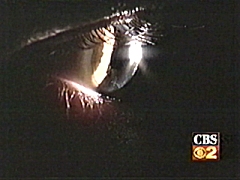 It promises improved eyesight and vision without glasses. But how much do you really know about the high-tech lasers that so many people are now turning to improve their eyes?
It promises improved eyesight and vision without glasses. But how much do you really know about the high-tech lasers that so many people are now turning to improve their eyes? 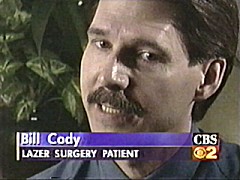 In the majority of cases, the procedure is problem-free. But some patients told CBS 2 News things can go terribly wrong.
In the majority of cases, the procedure is problem-free. But some patients told CBS 2 News things can go terribly wrong. 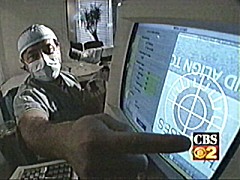 "Unfortunately, I have seen an increase in the number of patients that have had problems," added Dr. Wong.
"Unfortunately, I have seen an increase in the number of patients that have had problems," added Dr. Wong. 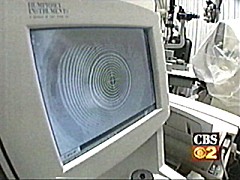 What went wrong? Dr. Fritch said either an irregular cut was made in Cody's cornea, or it was the laser itself.
What went wrong? Dr. Fritch said either an irregular cut was made in Cody's cornea, or it was the laser itself. 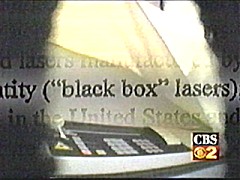 They are calibrated every day between patients, reported Gutierrez. But CBS 2 News learned that some doctors are using lasers called "black boxes" and imported lasers called "gray market" without FDA approval.
They are calibrated every day between patients, reported Gutierrez. But CBS 2 News learned that some doctors are using lasers called "black boxes" and imported lasers called "gray market" without FDA approval. 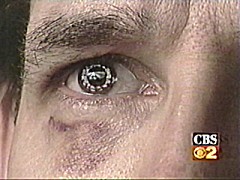 "I would not have used any investigational equipment or unapproved lasers," Freeman, who had laser surgery to improve his vision.
"I would not have used any investigational equipment or unapproved lasers," Freeman, who had laser surgery to improve his vision. 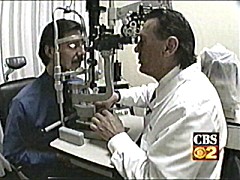 Cody said he doesn't know if the laser is responsible for his injuries, and he never thought to ask if the laser was even approved.
Cody said he doesn't know if the laser is responsible for his injuries, and he never thought to ask if the laser was even approved. 

